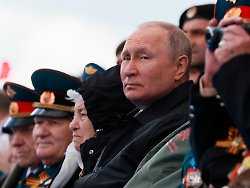No mobilization, no war aims and no military successes either: Putin’s speech on May 9 left out much of what western observers had expected. However, the Russian President is not backing down either.
Victory Day in Russia marks more than just a holiday to historically commemorate the victims of World War II and the achievements of the Soviet Army in the fight against the German Nazi occupiers. The day marks an identity-forming victory over fascism, an undeniably heroic achievement by the multinational state with its eventful, often bloody history. Russia’s President Vladimir Putin has always used this tradition to pompously legitimize his own rule. On this Monday, however, he dwelled only briefly on the story. Above all, he concentrated on justifying the war against Ukraine with supposed parallels to the fight against Hitler’s fascism.
Alone: Putin mentioned neither the word “war” nor the name of Ukraine. There is a reason for both: Since the attack began on February 24, there has been talk of a “special operation” in Russia. This has to do with the Kremlin’s original expectations, which clearly assumed that the conflict would last a few days before the Ukrainian government was overthrown.
On the other hand, the association of a “fratricidal war” between Russians and Ukrainians should probably be avoided and the Ukraine should not be upgraded to an opponent on an equal footing with the term. Like the tsarist rulers and Stalin, the Kremlin ideologues deny that there is such a thing as a Ukrainian culture, language, identity and thus a Ukrainian nation at all. That was probably one reason why Putin spoke only of the Donbass, the predominantly Russian-speaking region in eastern Ukraine.
No other war aims mentioned
Supporting the people of Donbass, fighting alleged Nazis in Ukraine, and defending Russian territory including annexed Crimea are Putin’s key justifications for the war – at least in his May 9 speech. On the other hand, Putin did not mention the Ukrainian head of state Volodymyr Zelenskyy at all. One of the Kremlin’s main goals in February was to overthrow the president whom Putin defamed as a drug addict. Putin also did not list the long-demanded demilitarization of Ukraine.
Putin also said nothing about possible other war goals besides defending the Donbass and repelling an attack by Ukraine and its NATO partners on Russia. Neither did he mention the conquest of Ukrainian territory between Crimea and Donbass, where Russian troops lost many soldiers and materiel in the battle for the port city of Mariupol. The autocrat also mentioned a possible conquest of the Black Sea coast west of Crimea, including the port city of Odessa. In recent weeks there have been fears that Russian troops could attempt a pincer attack from the Moldovan separatist republic of Transnistria. That scenario persisted, but at least Putin didn’t announce anything of the sort.
No referenda, but no backtracking either
Fears that the Russian President could announce referendums on joining the Luhansk and Donetsk regions or on secession of the occupied areas around Cherson have also not come true. There was also no announcement of military successes. With the exception of the Azovstal steel works, where Ukrainian fighters are still holed up, Russian troops now control the strategically important Mariupol. But the conquered corridor between Crimea and Donbass was not worth mentioning to Putin; just as little as the military successes in the Donbass, where Russian armed forces and separatist fighters are making little progress, according to Western intelligence reports.
In Putin’s speech, Russia’s conflict with the West remained primarily a military one. Despite the massive economic sanctions against his country, the head of state rhetorically did not open a home front. He refrained from perseverance slogans – despite price increases, the disappearance of Western companies and products from the Russian market and travel restrictions. Putin also refrained from a clear escalation: he neither threatened to use the Russian nuclear arsenal nor did the feared declaration of a state of emergency and general mobilization take place.
What this means for the further course of the war is unclear. Putin still has all these options in his hand and hasn’t indicated any backtracking either. After all, Putin didn’t say a word about an end to the war either.
